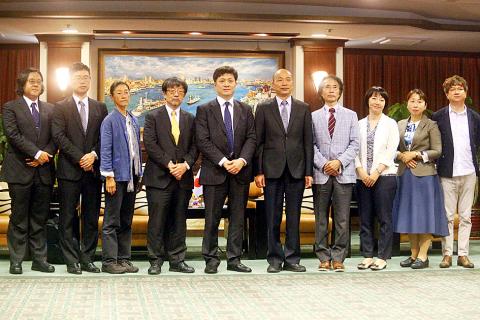Kaohsiung Mayor Han Kuo-yu (韓國瑜) took criticism yesterday for a lack of diplomatic etiquette after he joked on Friday about having waited for “25 minutes” for a meeting with a visiting Japanese delegation.
Han raised the ire of his Japanese guests after claiming that he was on time for the meeting with delegation members.
University of Tokyo political science professor Yasuhiro Matsuda on Friday posted on Facebook to refute Han’s claim, saying that the delegation had been late because of an unannounced venue change for the meeting with Han.

Photo: CNA
“It is hard to comprehend Mayor Han and his team’s ways of doing things,” Matsuda wrote.
Han, who arranged the meeting, changed the venue at the last minute and blamed the guests for being late, which was “evil,” Democratic Progressive Party Legislator Liu Shih-fang (劉世芳) said yesterday.
“However, being evil is not the worst thing — being stupid is,” she added.
Liu said that Han showed his stupidity by proposing a group photograph after his speech without giving delegation members a chance to speak, a move that completely ignored basic courtesy, and by inviting a group comprised of experts on cross-strait relations from the University of Tokyo, with members chiefly specializing in international relations and comparative politics.
Han’s main points in his speech to the group were his hopes that more Japanese would make films in Kaohsiung and that they would send their baseball teams to the municipality for winter training, Liu said.
Given the visit by the highly regarded academics, it might be expected that Tokyo hopes to gain insight into political and economic developments in Taiwan and what effects they could have on the Asia-Pacific region, she said.
As such, it was not difficult to understand why Matsuda made the comment on Facebook, as Han’s ignorance was simply embarrassing, she added.
Yesterday, in response to media queries for comments, President Tsai Ing-wen (蔡英文) said that officials should be discreet and follow international rules of courtesy when receiving foreign dignitaries who are visiting to learn about Taiwanese affairs.
Premier Su Tseng-chang (蘇貞昌) said that Han should have immediately apologized if there was any difficulty in meeting his guests due to a venue change, so he would set a good example for Taiwanese instead of embarrassing himself.
As a presidential hopeful, Han must be more mindful of his behavior, Su added.
The Kaohsiung City Government reiterated that Han apologized to the Japanese guests in a livestream on Friday night and stressed that they “had not been tardy at all.”
He said that hopefully the misunderstanding would not affect Kaohsiung’s future exchanges with Japanese academics.
There was no point for Liu to resort to personal attacks to make herself seem “more high-class,” the city government added yesterday.

A preclearance service to facilitate entry for people traveling to select airports in Japan would be available from Thursday next week to Feb. 25 at Taiwan Taoyuan International Airport, Taoyuan International Airport Corp (TIAC) said on Tuesday. The service was first made available to Taiwanese travelers throughout the winter vacation of 2024 and during the Lunar New Year holiday. In addition to flights to the Japanese cities of Hakodate, Asahikawa, Akita, Sendai, Niigata, Okayama, Takamatsu, Kumamoto and Kagoshima, the service would be available to travelers to Kobe and Oita. The service can be accessed by passengers of 15 flight routes operated by

Chinese spouse and influencer Guan Guan’s (關關) residency permit has been revoked for repeatedly posting pro-China videos that threaten national security, the National Immigration Agency confirmed today. Guan Guan has said many controversial statements in her videos posted to Douyin (抖音), including “the red flag will soon be painted all over Taiwan” and “Taiwan is an inseparable part of China,” and expressing hope for expedited reunification. The agency last year received multiple reports alleging that Guan Guan had advocated for armed reunification. After verifying the reports, the agency last month issued a notice requiring her to appear and explain her actions. Guan

GIVE AND TAKE: Blood demand continues to rise each year, while fewer young donors are available due to the nation’s falling birthrate, a doctor said Blood donors can redeem points earned from donations to obtain limited edition Formosan black bear travel mugs, the Kaohsiung Blood Center said yesterday, as it announced a goal of stocking 20,000 units of blood prior to the Lunar New Year. The last month of the lunar year is National Blood Donation Month, when local centers seek to stockpile blood for use during the Lunar New Year holiday. The blood demand in southern Taiwan — including Tainan and Kaohsiung, as well as Chiayi, Pingtung, Penghu and Taitung counties — is about 2,000 units per day, the center said. The donation campaign aims to boost

The Central Weather Administration (CWA) said a magnitude 4.9 earthquake that struck off the coast of eastern Taiwan yesterday was an independent event and part of a stress-adjustment process. The earthquake occurred at 4:47pm, with its epicenter at sea about 45.4km south of Yilan County Hall at a depth of 5.9km, the CWA said. The quake's intensity, which gauges the actual effects of a temblor, was highest in several townships in Yilan and neighboring Hualien County, where it measured 4 on Taiwan's seven-tier intensity scale, the CWA said. Lin Po-yu (林柏佑), a division chief at the CWA's Seismological Center, told a news conference